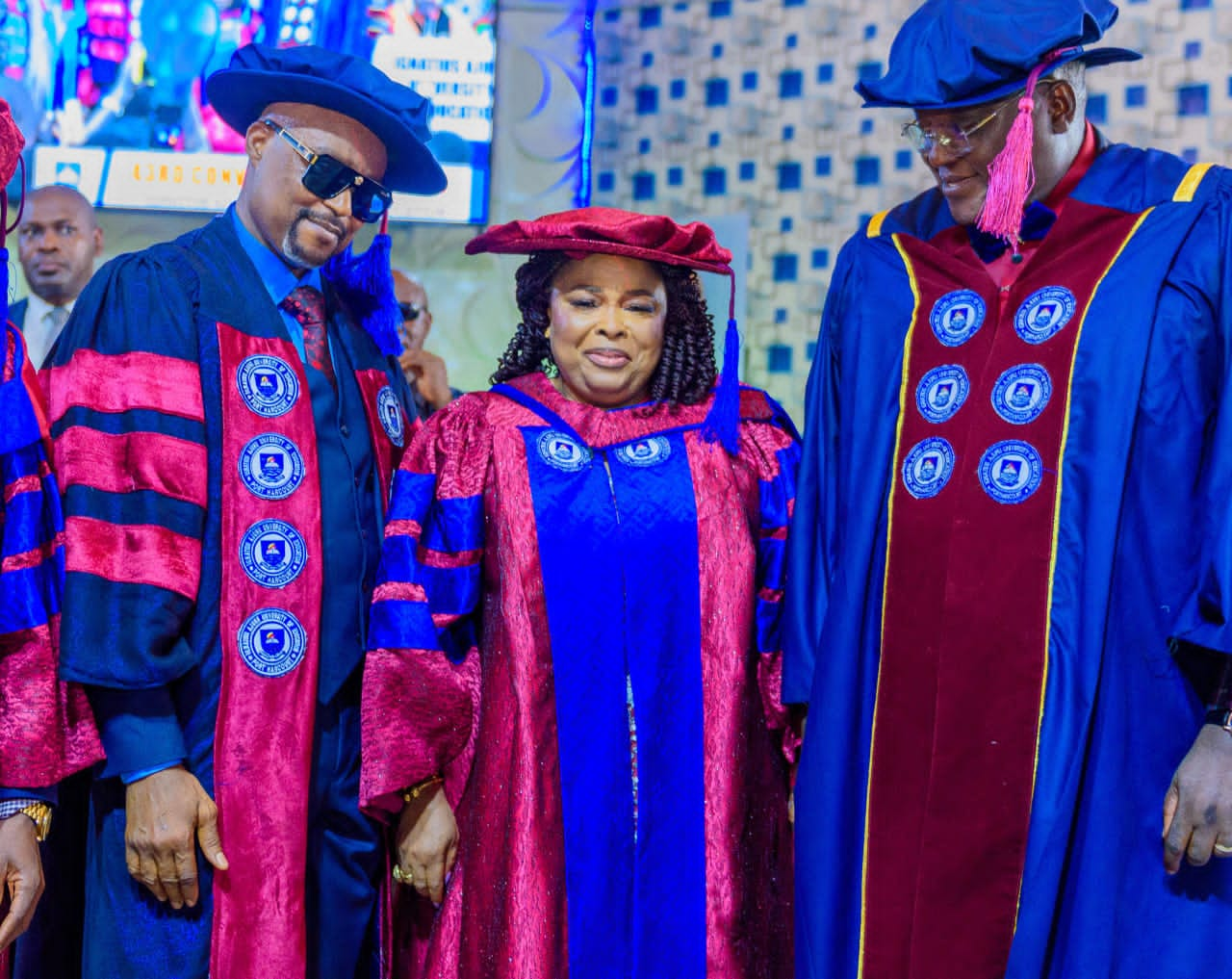Education
Don Wants Rehabilitation Centres In Rivers
In a bid to ameliorate the adverse effects of crude oil pollution activities on crop farms, relevant stakeholders have been urged to establish comprehensive scientific rehabilitation programme centres in Rivers State.
Speaking during the 47th inaugural lecture series of the Ignatius Ajuru University of Education (IAUE), Rumuolumeni, Port Harcourt, recently, titled: ‘Crude Oil Pollution, Crop Production and Farmers’ Welfare In Rivers State’, the inaugural guest lecturer, and Professor of Agricultural Production and Environmental Economics, Prof ThankGod Peter Ojimba stressed the need to establish rehabilitation centres in the State.
Ojimba while describing the inaugural lecture as apt, added that establishing such rehabilitation centres in the State would go a long way in addressing crude oil pollution as well its negative effects on crops.
He explained that the acquisition of crop farms from peasant farmers in Rivers State for crude oil exploration, exploitation and production activities has deprived crop farmers of tangible areas of land, resulting to loss of farmlands and output, hence, impoverishing the peasant crop farmers.
The Professor emphasised that the inadequate pattern of handling oil pollution issues by multinational oil companies in the State had caused more hardship on crop farmers than blessings.
Ojimba added that there is need to intensify the dissemination of benefits, from rehabilitation programmes as well as educating crop farmers on best practices and functional measures to adopt in case of unavoidable crude spillage.
He said commensurate fine should be paid to owners of farmlands without delay or denial, adding that this would help these farmers look for alternative means of livelihood instead of dying in abject poverty as a result of the oil spill.
“Adequate list of all farmlands affected by crude oil pollution should be compiled and commensurate amount of compensations paid by oil companies responsible for the acquisition of land affected to the owners of such farmlands promptly in line with economic trends in the country after the correct evaluation of land and crop areas lost have been ascertained by experts.
“If compensations are paid promptly to farmers affected by crude oil pollution, they will seek alternative means of livelihood by diversifying their resources and sources of income to seek for greater off-farm income.
“This would in turn create less dependency on crop farming in crude oil pollution-prone areas will help reduce the tension, conflicts, violence, protests poverty and hardship, agitation of resource control between the host communities and the multinational oil companies and the government, among others,” he said.
He recommended that educating farmers on best practices as well as functional measures to adopt whenever oil spillage occurs would help in protecting farm crops against crude oil pollution.
On his part, the Vice Chancellor of the institution, Prof. Okechuku Onuchuku stated that oil production and hydrocarbon activities in the society had actually increased the poverty level of the people.
Onuchuku explained that the inaugural guest lecturer had presented an empirical view of developing a model that would address the crude oil pollution using crop production as a dependent variable and crude oil production as an expiring variable.
“The result shows very clearly that crude oil production has actually affected our crop production negatively because of its negative impact on farmlands and aquatic life.
“You know, when there is oil spill, you will find aquatic life very difficult as the fishes which is our food and a major source of income will die, thereby bringing untold hardship on the people in the State,” Vice Chancellor said.
By: Susan Serekara-Nwikhana
Education
‘Our Target Is To Go Beyond Academic Accomplishments’

The Acting Vice Chancellor of Ignatius Ajuru University of Education, Port Harcourt, Prof. Okechuku Onuchuku, emphasised the need for students to go beyond academic achievements during the university’s 43rd Convocation ceremony.
The theme, “The University Culture In Practice, The IAUE Experience,” highlights the importance of embracing cherished traditions and intellectual values that define great universities.
Prof. Onuchuku encouraged the new graduates to work hard and persevere, noting that their convocation marks a new beginning in their careers and personal lives. He emphasised that they must prove themselves worthy of the certificates and prizes they have received.
According to him, out of 2,887 first-degree graduands, four made First Class, 403 secured Second Class Upper, 2,030 got Second Class Lower, and 450 graduated with Third Class. Additionally, 1,492 postgraduate students graduated, including 306 PhD holders.
The Sole Administrator of Rivers State, Vice Admiral Ibok-Ete Ekwe Ibas (Rtd), praised the university’s commitment to academic excellence and institutional maturity. He commended the Acting Vice Chancellor for achieving full accreditation for 47 academic programmes and implementing the NUC’s Core Curriculum Minimum Academic Standards.
The administrator urged the new graduates to uphold the positive values instilled in them by the university and strive for continuous knowledge and improvement.
By: King Onunwor
Education
Niger Delta Students Suspend Protest Against NDDC In PH

The Niger Delta Students Union Government, Rivers State Chapter (NIDSUG), has suspended its planned protest against the Niger Delta Development Commission (NDDC) state office in Port Harcourt. The suspension followed an intervention by the state Commissioner of Police, CP Olugbenga Adepoju.
The students had planned to protest on Thursday, citing alleged neglect by the NDDC, particularly in welfare and capacity-building programmes for students from the state. However, after the police intervention, the students agreed to participate in a roundtable discussion with the commission to address their concerns.
NIDSUG leader, Comrade Loveday Njoku, expressed dissatisfaction with the commission’s alleged exclusion of students from benefiting from its programmes. He presented a seven-point demand, including the reintroduction of scholarships for undergraduate and postgraduate students. Njoku emphasised that education is crucial for community development and urged the commission to invest in the future leaders of the state.
The students warned that if their demands are not met, they will resume the protest and occupy the state commission office until their demands are addressed. Despite previous attempts to reach out to the commission’s management team, the students claimed their efforts were unsuccessful.
By: Akujobi Amadi
Education
Administrator Inspects School

As part of efforts to improve the welfare and overall quality of education for students in Obio/Akpor Local Government Area, the Sole Administrator, Sir (Dr.) Clifford Ndu Walter DSSRS, FCAI, JP, paid an unscheduled visit to Universal Primary School, Rumukwurusi.
During the visit, Sir Walter expressed deep concern over the deplorable state of the school and its surrounding environment. He reaffirmed his administration’s commitment to the development of the education sector, stressing its critical role in nation-building.
“I have visited the primary school in Ogbogoro, and now I’m here at the Universal Primary School, Rumukwurusi. I am not satisfied with what I’ve seen,” he stated, indicating that more surprise visits to schools would follow.
To address the issues, the Sole Administrator directed the Council Engineer to commence process for rehabilitation of the school.
The visit was part of a broader initiative aimed at conducting on-the-spot assessments of educational facilities to determine the level of intervention required by the local government council.
Dr. Walter also assured the teachers of his unwavering commitment to revamp the school and improve the learning environment for both staff and students.
-

 News4 days ago
News4 days agoCourt Sentences Gospel Singer To Death For Killing Girlfriend In Nasarawa
-

 Politics4 days ago
Politics4 days agoMakinde Renames Polytechnic After Late Ex-Gov
-
Sports4 days ago
Olympic Day Sparks Nationwide Fitness Fever
-

 Nation4 days ago
Nation4 days agoOgoni Stakeholders Hail Zabbey’s Performance
-
Sports4 days ago
I Joined Saudi League To Win Titles – Senegal Keeper
-

 Niger Delta4 days ago
Niger Delta4 days agoOBALGA Sole Administrator Presents Brand New Fire Extinguishers To Council …Commiserates With Traders Over Rumuomasi Market Fire Incident …Commences Desilting Of Drainages
-

 News4 days ago
News4 days agoWDD: Tinubu Seeks Global Action On Drug Abuse
-

 Featured4 days ago
Featured4 days agoTinubu Signs Four Tax Reform Bills Into Law …Says Nigeria Open For Business

